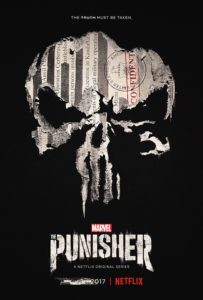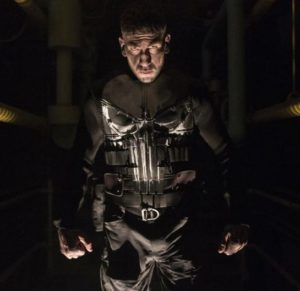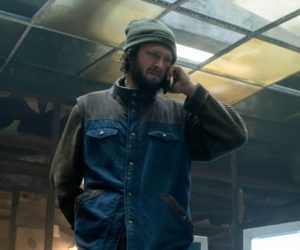 Marvel’s The Punisher Season 1
Marvel’s The Punisher Season 1
Production: Marvel Television and ABC Studios
Platform: Netflix Originals
Created By: Steve Lightfoot
Release: 11/17/2017
CAST: Jon Bernthal (The Walking Dead, The Accountant)
Ebon Moss-Bachrach (HBO’s Girls and John Adams)
Amber Rose Revah (Son of God, Emerald City)
Ben Barnes (The Chronicles of Narnia: Prince Caspian, HBO’s Westworld)
Deborah Ann Woll (Daredevil, True Blood)
Daniel Webber (Hulu’s 11.26.63, Thumper)
Michael Nathanson (The Wolf of Wall Street, The Knick)
The success of the Marvel Cinematic Universe on Netflix has proven to be a pop culture phenomenon, spawning not only the four original series (Daredevil, Jessica Jones, Luke Cage, and Iron Fist), but also the Marvel’s Defenders miniseries and now, The Punisher spinoff. I would like to preface this review by stating that this submission was considered primarily in relation to these preceding Netflix Originals. As it correlates to the existing MCU mythos, The Punisher takes the top spot for me above Jessica Jones. The reason for that, quite simply is consistency. Daredevil fluctuates far too much in tone. At times the show doesn’t know if it wants to be a sitcom, crime drama, or CW action series. Jones was definitely more consistent to me. The darker tone gave the story some gravity, and the villain was exceptionally well conceived and personified by David Tennant. Jessica Jones was a masterclass in arch villainy, specifically because Killgrave’s ability rendered her strength useless. She had to know him, to be connected to him, and ultimately be compromised by him to get close enough to defeat him. In the end, psychological intimacy was a devastating tool and her endgame required more sophistication than simply relying on powers. Overall, the predator/prey dynamic was presented with harrowing poignancy and the stakes for the supporting characters were agonizing.

Thematically, each show presents its’ own unique take on this shared universe, home to a diverse range of heroes from hypersensitive litigators to bulletproof vigilantes, with nods and easter eggs correlating to the broader MCU sporadically interwoven. Such an odd addition then, introducing brooding and homicidal stalwart Frank Castle to the mix during the second season of Daredevil. Calling the man an anti-hero is generous. He is a grunt; an unapologetic and hopelessly blunt instrument in an increasingly complex societal hierarchy of super powered entities, local escalations, and interstellar threats. Still, his gruff demeanor and decisive application of violent retribution have made The Punisher a fan favorite among Marvel’s small screen offerings. To capitalize on that following, creator and showrunner Steve Lightfoot has crafted an introspective meditation on the character, exposing some of the moral and emotional quandaries that plague men like him. Men who are highly trained and driven to shed very basic interpersonal considerations in pursuit of completing the mission. The cost of that conditioning on the men who accept this responsibility is not lost on this production team. If anything, it has driven them to craft a relevant and surprisingly nuanced contribution to the MCU.
Played to chilling perfection by Jon Bernthal, Castle begins the season in hiding and presumed dead by the authorities; just the way he likes it. We observe him operating with merciless efficiency, still driven by the death of his family and relentlessly hunting those involved. Not long after eliminating the last of his targets, he is contacted by elusive hacker Micro, played by Ebon Moss-Bachrach, with a promise of information on the true cause of his family’s murder. Micro reveals that a massive military conspiracy tied to the highest levels of the Central Intelligence Agency’s Directorate of Operations found its’ way right to Castle’s door and offers the vigilante opportunity to settle the score. Simultaneously, Department of Homeland Security Special Agent Dinah Madani has been newly transferred to the NYC field office following a debacle concerning her intelligence post in Afghanistan. Portrayed by English actress Amber Rose Revah, the ambitious and determined Madani sets out to follow up on her previous assignment, the assassination of an Afghan law enforcement officer, and incidentally makes contact with Castle.

From there the plot unfolds into a dense spiral of deception, betrayal, and brutal vengeance. Rounding out the cast are Deborah Ann Woll as Karen Page, Michael Nathanson as Sam Stein, and Ben Barnes as former Force Reconnaissance Marine Billy Russo. Moss-Bachrach manages a similarly rich and layered performance against Bernthal’s Castle, and scenes between the two consistently lend levity, humanity, and even palpable tension to the narrative. I had almost forgotten, but must mention a truly stand out performance from Daniel Webber, whose tortured and alienated former soldier Lewis Wilson is integral to a substantial subplot dealing with social reintegration after combat. It really seems like the developers on this series went out of their way to capture and present the effects of trauma in a way that we don’t frequently see in comics-related media. I applaud their commitment, though some scenes may be difficult to watch for those dealing with their own painful experiences. I feel these sequences ground the story in a very tangible and empathetic way, though some might see the content as gratuitous, or even exploitive.
There is a great deal of humility in this story. Frank Castle does not have superpowers. He gains competent and even dedicated allies, but he doesn’t benefit from billion dollar armored suits or a clandestine paramilitary command and control apparatus. He is a man apart, and that sense of isolation and independence is really drilled home in early episodes. As the season progresses, his vulnerability is apparent. His story is one of perpetual betrayal and his inner turmoil reflects a military career rife with moral compromises that have cost him dearly. And rightly so. Frank is flawed, constantly struggling with traumatic flashbacks and lapses in self control, and his humanity is ultimately what draws the viewer in, over the bombastic action sequences and procedural intrigue we’ve come to expect. He attempts to repress any feeling or expression that would betray a very deep reservoir of emotion that he cannot entirely contain, with torturous consequences. However, that same emotion effectively vectored on an adversary or circumstance is truly awesome to behold. When combined with his training, ingenuity, and paranoia the man becomes the monster.

That weight is a specter ever present in Bernthal’s performance. It is oppressive and immutable, and yet we are riveted to his narrative. Not because we want him to triumph over the predictable caricatures pitched as his adversaries, but because as we watch him inadvertently build relationships that he needs but doesn’t want, we hope for him to triumph over himself. To reach a point of completion where it is okay for him to just be; which, for victims of personal trauma, is often an agonizing and lifelong battle. To have that struggle executed so flawlessly as entertainment, to draw our unabashed curiosity and intrinsically relate ourselves to such an morally ambiguous protagonist is an achievement. You see him smile in the quiet moments, in spite of all the horror and fury, and want to say, “See Frank, maybe it’s going to be okay.” Like we know him. Like we’re there. That is exceptional storytelling, for however briefly the immersion lasts, and proves The Punisher a far greater experience than the sum of its parts.
Christian Davenport
